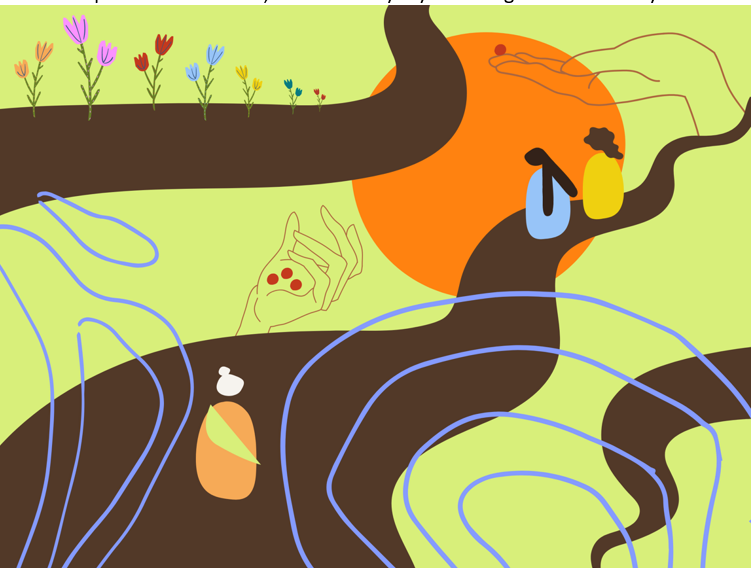
This art piece, We Walk Around, Always, was created by Minet for her thesis. It shows the many layers of story and how we are wholistically connected to the stories of others.
Nov. 2, 2021

This is part of series of articles where we asked the fall cohort of the class of 2021 to reflect on their time at the university and share what they learned and loved about their time here. For more student responses, visit Congratulations, Class of 2021.
Chantai Minet graduated with a Master of Science in Educational Psychology, with a specialization in Counselling Psychology, in Fall 2021. Also a BA’14 grad, her research explores contemporary Indigenous identity and well-being. For her thesis, Minet explored the relationality of four Indigenous graduate students using filmed research conversations, stories and poetry.
Minet took a few minutes to answer our questions about her time at the University of Calgary.
Remember that you are not the only one feeling the way you do. Many others are starting with you, and you will eventually be each other’s support system. Be kind — to yourself and to others — as you begin this journey.
Practically speaking, show up early, so you aren’t in a rush. Pick up a treat that you enjoy, maybe your favourite tea or coffee, and celebrate yourself for making it here today.
My thesis, “‘We Stick Out Our Tongues’ De-essentializing for Decolonization: A Storywork Study on Indigenous Relationality,” is a project and a process I am most proud of. It is an unearthing of Indigenous relationality that took me on a journey of the mind, body, heart and spirit. My thesis journey, and the relationships formed within it, offered many mysterious gifts which vitally transformed me and my life.

This art piece, We Walk Around, Always, was created by Minet for her thesis. It shows the many layers of story and how we are wholistically connected to the stories of others.
You never know the impact one interaction may have on a life. This was certainly my experience during my second year of the (Master of Science) program. I was going through a lot, personally and professionally. Frankly speaking, I was contemplating giving up my studies. It was at this time when a guest lecturer, Dr. Elisa Lacerda-Vandenborn, shared her story and wisdom with me through the Brazilian story of the hummingbird who did what she could to help a world on fire. The story, and the newly formed relationship, encouraged me to keep going and reminded me why I chose the path I am on.
In the process of my research, I learned that, for Indigenous people, one of the most powerful acts of decolonization is reclaiming who we are and sharing our stories with the world. I learned how to listen to, learn from and pass on stories. I learned the meaning and power of reciprocity. The best example of this learning that I can think of is this poem I wrote about it:
The Shape of Listening
Your story shaped my listening,
I heard you first through the anatomy of my ear,
But then I heard you with the ear of my own soul, Something I was glad to do,
To hear you,
And to hear you now,
Telling me of your dreams that carry messages,
Of Elders who taught you to listen,
Of relationships with your great grandmothers,
And the happiest memories of your childhood trapline,
I hear you now,
The fear in your voice that mirrors mine,
That this might be the only time,
To share that the world is on fire,
And that you can feel it in your blood,
To tell stories of your hand beaded earrings,
Your grandfather speaking through salmon,
Your own efforts to “swim up river,”
And what it means to you,
Your mother remembers the day she was born,
And because of that you sit alone at lunch,
And in the cages where there was once slaughter,
You would like to plant a garden,
Pick berries and eat them as is,
Let the land heal us again,
Medicine for this exhaustion,
A braid of grass,
A bending willow,
Your story shaped my listening,
The hope of a hummingbird,
Who sees that this world is on fire,
And carries one drop of water in her mouth.
The benches outside the Education Tower, near the bus loop. I would often begin and end my days there. I loved seeing all the students arriving to begin their day of learning and connecting. After the day was done, I would sit and wait for the bus, write or draw, and reflect on that day on campus. I’ve never thought about that space as special until considering this question.
As I navigate my next steps, I am hopeful about the ways I am involved in community work and as an emerging professional. I am continuing my role as the project facilitator for What Does Reconciliation Mean to Me? (for the) ii' taa'poh'to'p Indigenous Strategy, as well as co-instructing Introduction to Psychology from a Decolonized Perspective at Old Sun College in Siksika Nation. I work as a youth advisor and work group member with the Yukon Child & Youth Advocate Office, which is tasked with making community-led amendments to the Yukon Child and Youth Advocate Act. And I’m in the process of becoming a provisional psychologist in Alberta, with hopes of guiding healing in Alberta, as well as with my community in the Yukon.